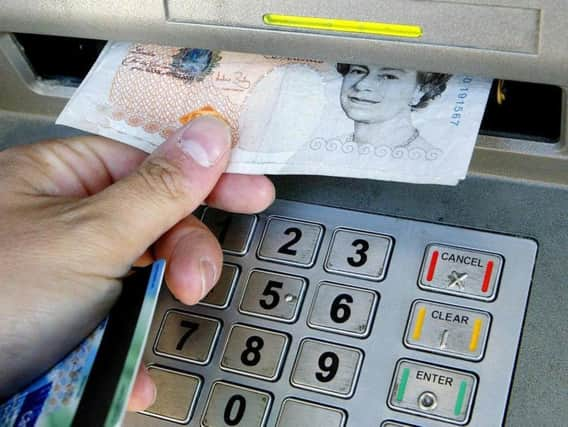Britain needs a new regulator to protect consumers' access to cash, says Which?


Read more
Which? is concerned that people who prefer to use cash might not get a fair deal at a time when bank branches are closing and cash machines – or ATMs – are becoming harder to find.
Advertisement
Hide AdAdvertisement
Hide AdA Which? spokesman said: “In a world of contactless payments and flashy new banking apps, it’s easy to forget about the cash in your wallet.
“But cash is a necessity many couldn’t live without and it’s a vital backup when digital payment systems fail.”
Which? said that small business owners, people on tight budgets and those living in rural communities often rely on cash.
Which? said: “In fact, 25 million people across the country still see cash as a necessity and over 2 million are almost entirely dependent on it to live their lives,
Advertisement
Hide AdAdvertisement
Hide Ad“But our ability to use cash is being eroded. We’re losing free cash points at an alarming rate. And banks are constantly closing local branches. As more and more of us use digital transactions to pay for things, those who still want to pay with cash are losing out.
“We’re concerned that the UK is drifting towards being a society that’s intolerant of people who have not transitioned away from cash to digital payments.”
Which? has joined forces with the Federation of Small Businesses (FSB), the British Retail Consortium (BRC) and Association of Convenience Stores (ACS) to make sure no one is left behind.
The campaign is demanding that the Government sets up a regulator to protect consumers’ access to cash and build a sustainable cash infrastructure for the UK. It is demanding that banks and building societies do more to ensure customers are adequately supported as Britain moves towards an increasingly digital society.
Advertisement
Hide AdAdvertisement
Hide AdThe campaign is also calling on The Payment Systems Regulator to immediately review LINK’s financial inclusion programme and stop cash machines disappearing from communities that rely on them.
Martin McTague, policy chairman at the Federation of Small Businesses (FSB), said: “For a lot of small businesses, cash is king – with many of their customers still wanting to pay in cash. “But with bank branches and ATMs closing at a rate of knots, it’s harder and harder for shoppers to access cash.
“Cashless transactions can mean additional costs for small firms – businesses spend close to £1bn a year processing card payments. These costs stifle businesses across the country, and we therefore welcome the Payment Systems Regulator’s review of the card terminal market.”
Mr McTague added: “Small firms are prohibited from directly passing on the costs of processing cards, meaning that many have no choice but to absorb the cost or increase prices when a lot of customers opt to pay on card.
Advertisement
Hide AdAdvertisement
Hide Ad“Of course, going cashless can be the right choice for some small firms. But, for many, refusing to accept cash would mean losing customers.”
A Building Societies’ Association spokesperson said: “As savings providers, building societies provide access to cash primarily through their network of around 1,450 branches across the UK.
“Even in our growing digital world a physical presence remains important and some societies have consciously maintained branches in locations where other providers have withdrawn.
“In addition to providing access to cash, branches can contribute to healthy high streets and communities and offer people a go-to place to discuss their more complex financial needs and solve problems.”
Advertisement
Hide AdAdvertisement
Hide AdA UK Finance spokesman said it was working with the Joint Authorities Cash Strategy Group (JACS) to help ensure cash continues to be available to those who need it.
The spokesman said: “More detailed work is required to understand the future cash needs of local communities, in particular, remote rural and urban deprived communities, and to design a system which addresses how those community needs can best be served quickly and efficiently, should a problem emerge.”
UK Finance is engaging with consumer and local authority representatives and market participants, including LINK and its members,
Stephen Jones, the chief executive of UK Finance, said: “Securing free access to cash for those who continue to need to use it is a clear shared objective – and one that government, regulators, industry, customer groups and communities need to come together to solve.
Advertisement
Hide AdAdvertisement
Hide Ad“We need to take a collaborative approach to the problem and work out a shared solution.
“Today the banking and finance industry is setting out a clear statement of intent and a series of practical next steps to ensure that cash will remain widely accessible and free for those that need it.”
A Treasury spokesperson said: “We know that many people rely on cash for their day-to-day spending.
“That’s why we’re coordinating work across government, regulators and industry so we can protect access for everyone who needs it.
Advertisement
Hide AdAdvertisement
Hide Ad“Part of this work includes investing over £2bn in the Post Office since 2010, giving 99 per cent of customers local access to everyday banking services at one of its 11,500 branches.”
The spokesman added: “LINK has committed to replace closed ATMs in rural or remote areas when there is no free ATM within 1 kilometre or Post Office branch available. LINK has also implemented "super premiums" to further safeguard free-to-use ATMs in remote and deprived areas.